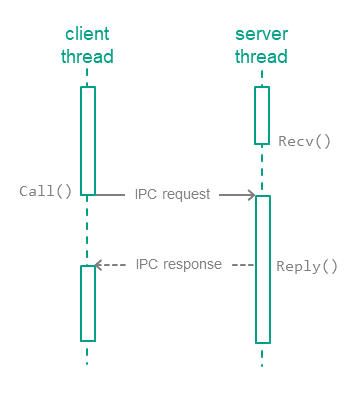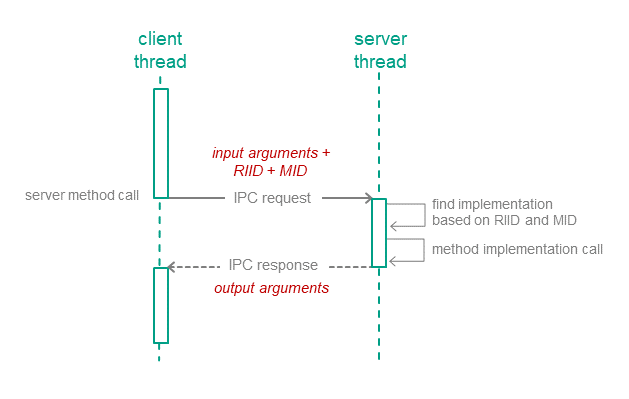IPC mechanism
Exchanging IPC messages
In KasperskyOS, processes interact with each other by exchanging IPC messages (IPC request and IPC response). In an interaction between processes, there are two separate roles: client (the process that initiates the interaction) and server (the process that handles the request). Additionally, a process that acts as a client in one interaction can act as a server in another.
To exchange IPC messages, the client and server use three system calls: Call(), Recv() and Reply() (see the figure below):
- The client sends an IPC request to the server. To do so, one of the client's threads makes the
Call()system call and is locked until an IPC response is received from the server. - The server thread that has made the
Recv()system call waits for IPC requests. When an IPC request is received, this thread is unlocked and handles the request, then sends an IPC response by making theReply()system call. - When an IPC response is received, the client thread is unlocked and continues execution.

Exchanging IPC messages between a client and a server
Calling methods of server endpoints
IPC requests are sent to the server when the client calls endpoint methods of the server (hereinafter also referred to as interface methods) (see the figure below). The IPC request contains input parameters for the called method, as well as the endpoint ID (RIID) and the called method ID (MID). Upon receiving a request, the server uses these identifiers to find the method's implementation. The server calls the method's implementation while passing in the input parameters from the IPC request. After handling the request, the server sends the client an IPC response that contains the output parameters of the method.

Calling a server endpoint method
IPC channels
To enable two processes to exchange IPC messages, an IPC channel must be established between them. An IPC channel has a client side and a server side. One process can use multiple IPC channels at the same time. A process may act as a server for some IPC channels while acting as a client for other IPC channels.
KasperskyOS has two mechanisms for creating IPC channels:
- The static mechanism allows the parent process to create an IPC channel between child processes. Static creation of IPC channels is normally performed by the initializing program.
- The dynamic mechanism allows already running processes to create IPC channels between each other.